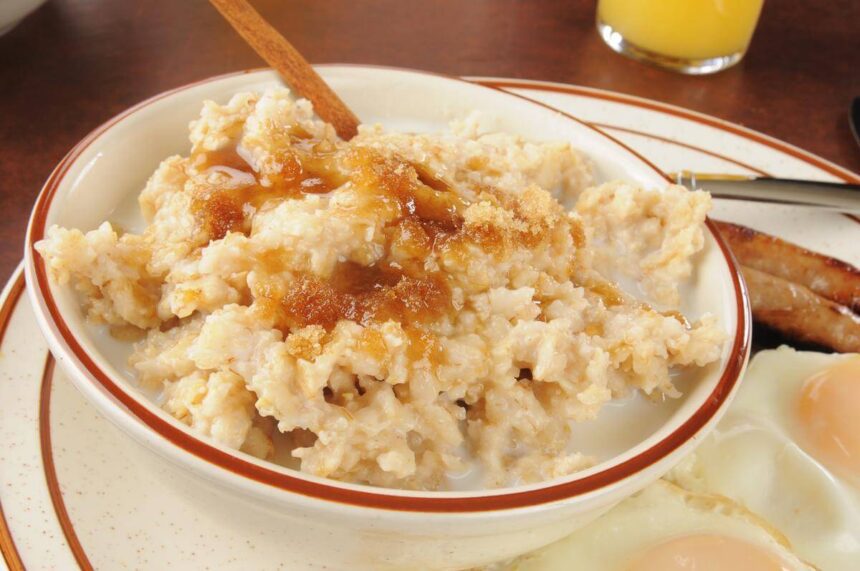As responsible pet owners, it’s crucial to ensure that our feline friends are provided with a well-balanced diet that meets their nutritional needs. While cats are obligate carnivores, meaning their bodies are designed to thrive on a meat-based diet, they can occasionally tolerate small amounts of non-meat foods. One common question that arises is whether cats can safely consume oatmeal with brown sugar. In this article, we will delve into the topic and explore the potential risks and benefits associated with feeding oatmeal with brown sugar to cats.
Can Cats Eat Oatmeal?
When it comes to oatmeal, it is generally safe for cats to consume plain, cooked oatmeal in small amounts. However, it’s important to note that oatmeal should not be a significant component of a cat’s diet, as they lack the enzymes necessary to digest carbohydrates efficiently.
Oatmeal is a good source of fiber and can provide some digestive benefits for cats, especially if they are experiencing constipation or other gastrointestinal issues. Additionally, oatmeal can be a useful ingredient in homemade cat treats or as an occasional addition to their regular diet. However, it should never replace the essential meat-based proteins that cats need to thrive.
Can Cats Eat Brown Sugar?
While oatmeal on its own can be considered safe for cats in moderation, the inclusion of brown sugar poses some risks. Brown sugar is a sweetener derived from sugar cane or sugar beets, and it is essentially regular table sugar with the addition of molasses. Feeding brown sugar to cats can potentially lead to several health issues:
Obesity
Brown sugar is high in calories and can contribute to weight gain in cats if consumed regularly. Obesity can lead to various health problems, including diabetes, heart disease, and joint issues.
Dental Problems
The high sugar content in brown sugar can contribute to dental decay and plaque buildup in cats, leading to oral health issues such as periodontal disease.
Diabetes
Cats are prone to developing diabetes, and a diet high in sugar can increase their risk. Feeding foods like oatmeal with brown sugar may elevate blood sugar levels and stress the pancreas, potentially leading to insulin resistance and diabetes over time.
Digestive Upset
Cats’ digestive systems are sensitive, and the introduction of sugary foods like brown sugar can lead to gastrointestinal issues such as diarrhea or upset stomach.
Alternatives to Oatmeal with Brown Sugar
If you’re looking to add variety to your cat’s diet or provide occasional treats, there are alternative options that can be healthier and more suitable for feline consumption:
Plain Cooked Oatmeal
Instead of adding brown sugar, you can offer plain cooked oatmeal to your cat. Remember to serve it in small amounts and monitor your cat’s reaction.
Cat-Specific Treats
Opt for commercially available cat treats that are specifically formulated to meet their nutritional needs. These treats are designed to be both delicious and healthy for your feline friend.
High-Quality Cat Food
Ensure that your cat’s diet primarily consists of nutritionally balanced, high-quality cat food. Look for products that list meat as the primary ingredient and are formulated to meet the dietary requirements of cats.
Consulting with a Veterinarian
As with any dietary changes or concerns regarding your cat’s nutrition, it is always recommended to consult with a veterinarian. They can provide personalized advice based on your cat’s specific needs, health condition, and dietary requirements.
FAQ’s
Can cats eat oatmeal without any additives like brown sugar?
Yes, cats can eat plain, cooked oatmeal in small amounts. It can be a source of fiber and may have some digestive benefits for cats. However, it should not replace the primary meat-based diet that cats require for optimal health.
Is oatmeal safe for cats with sensitive stomachs?
Oatmeal can be gentle on a cat’s digestive system and may help with mild gastrointestinal issues like constipation. However, if your cat has a sensitive stomach or a history of digestive problems, it is best to consult with a veterinarian before introducing oatmeal into their diet.
Can oatmeal with brown sugar cause diabetes in cats?
Feeding oatmeal with brown sugar to cats on a regular basis can potentially contribute to the development of diabetes. Cats are prone to diabetes, and a diet high in sugar can increase their risk. It is advisable to avoid giving sugary foods to cats to maintain their overall health.
Can I add other ingredients to oatmeal for my cat, such as fruits or vegetables?
While cats are primarily carnivores and have specific nutritional needs, they can tolerate small amounts of some fruits and vegetables. However, it is important to note that cats have different digestive systems compared to humans, and not all fruits and vegetables are safe for them. Some fruits, such as grapes and raisins, can be toxic to cats. Certain vegetables, like onions and garlic, can also be harmful. It is best to consult with a veterinarian before introducing any new ingredients to your cat’s diet to ensure their safety and suitability.
Can oatmeal be beneficial for cats with hairballs?
Oatmeal, due to its fiber content, may help with mild hairball issues in cats. The fiber can assist in moving hair through the digestive tract and reducing the formation of hairballs. However, it is important to note that if your cat is experiencing frequent or severe hairball problems, it is recommended to consult with a veterinarian for appropriate management and treatment options.
Can oatmeal be a substitute for cat food in emergency situations?
Oatmeal should never be used as a substitute for cat food, especially in emergency situations. Cats have specific nutritional requirements that can only be met through a balanced diet formulated for their needs. In emergency situations, it is best to contact a veterinarian or animal welfare organization for guidance on appropriate food options for your cat.
Can oatmeal help with a cat’s diarrhea?
In some cases, oatmeal can help alleviate mild diarrhea in cats. The fiber content in oatmeal can have a binding effect on the stool, helping to firm it up. However, it is important to determine the underlying cause of the diarrhea, as it can be a symptom of various health issues. If your cat is experiencing persistent or severe diarrhea, it is crucial to consult with a veterinarian for proper diagnosis and treatment.
Are there any risks associated with feeding oatmeal to cats?
Feeding oatmeal to cats in moderation is generally safe. However, it is important to monitor their response to oatmeal, as individual cats may have different sensitivities or allergies. Additionally, if oatmeal is served with additives like brown sugar or other sweeteners, it can pose risks such as obesity, dental problems, and potential diabetes. Therefore, it is crucial to offer oatmeal to cats without any added sugars or sweeteners.
Can oatmeal be beneficial for senior cats?
Oatmeal can be beneficial for senior cats in small amounts, as it provides dietary fiber that may aid in digestion and help prevent constipation. However, it should not replace the essential nutrients found in high-quality senior cat food, which is specifically formulated to meet the unique needs of aging cats. Senior cats require specific nutrients, such as joint-supporting ingredients, to maintain their health and mobility. Consulting with a veterinarian for appropriate senior cat nutrition is recommended.
Can cats have oatmeal as a regular part of their diet?
Cats should not have oatmeal as a regular part of their diet. While small amounts of plain cooked oatmeal can be tolerated by some cats, it should not replace the essential meat-based proteins and nutrients that cats require. Oatmeal lacks certain vital nutrients that are crucial for a cat’s overall health. It is important to provide a balanced and species-appropriate diet for cats, primarily consisting of high-quality cat food specifically formulated to meet their nutritional needs.
Can oatmeal cause allergies in cats?
Oatmeal itself is not a common allergen for cats. However, individual cats may have specific food sensitivities or allergies to certain ingredients, including grains. If you notice any signs of allergies such as itching, gastrointestinal upset, or skin irritations after feeding oatmeal to your cat, it is best to consult with a veterinarian. They can help determine if your cat has an allergy or sensitivity to oatmeal or any other specific ingredient.
Can oatmeal help with a cat’s weight management?
Oatmeal, due to its fiber content, can help provide a feeling of fullness and may be beneficial for weight management in some cats. It can help promote satiety and potentially reduce overeating. However, it is important to remember that the primary focus for weight management in cats should be through a balanced and portion-controlled diet that is appropriate for their specific needs. Consulting with a veterinarian for guidance on weight management strategies for your cat is recommended.
Is it safe to feed oatmeal to kittens?
Kittens have specific nutritional requirements for their growth and development. While small amounts of plain cooked oatmeal can be offered to kittens as an occasional treat, it should not be a regular part of their diet. The primary source of nutrition for kittens should be high-quality kitten food that is specially formulated to meet their needs. It is important to consult with a veterinarian to ensure that your kitten’s diet is appropriate for their age and stage of development.
Can cats with diabetes eat oatmeal?
Cats with diabetes require a carefully managed diet to help regulate their blood sugar levels. Feeding oatmeal to cats with diabetes is not recommended, especially if it contains any sweeteners like brown sugar. Oatmeal can still have an impact on blood sugar levels due to its carbohydrate content. It is essential to work closely with a veterinarian to develop a specific diabetic diet plan for cats, which focuses on low-carbohydrate and high-protein foods.
Can oatmeal be used as a remedy for urinary issues in cats?
Oatmeal is not a specific remedy for urinary issues in cats. While it may help increase water consumption due to its moisture content, urinary issues in cats require proper diagnosis and treatment by a veterinarian. Conditions such as urinary tract infections, bladder stones, or urinary blockages may require specific medical interventions, dietary adjustments, and possible prescription diets. It is crucial to consult with a veterinarian to address any urinary issues your cat may be experiencing.
Conclusion
While cats are primarily carnivores and have specific nutritional needs, they can tolerate small amounts of non-meat foods on occasion. Oatmeal, in moderation and without brown sugar, can be safely offered to cats as an occasional treat or supplement to their regular diet. However, it is important to remember that cats require a diet rich in high-quality animal protein for optimal health. Therefore, the inclusion of oatmeal or any other non-meat foods should be limited and should never replace the essential components of their diet. When in doubt, consult with a veterinarian to ensure you are providing the best possible nutrition for your feline companion.



